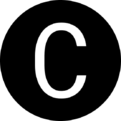 Logo on Carbon's GitHub organization | |
| Family | C |
|---|---|
| Designed by | |
| Typing discipline | Static, nominative, partly inferred |
| Implementation language | C++ |
| License | Apache-2.0-with-LLVM-Exception |
| Filename extensions | .carbon |
| Website | github |
| Influenced by | |
| C++, Rust, Swift [citation needed] | |
Carbon is an experimental programming language designed for connectiveness with C++.[1] The project is open-source and was started at Google. Google engineer Chandler Carruth first introduced Carbon at the CppNorth conference in Toronto in July 2022. He stated that Carbon was created to be a C++ successor.[2][3][4] The language is expected to have an experimental MVP version 0.1 in 2025 and a production-ready version 1.0 after 2027.[5]
The language intends to fix several perceived shortcomings of C++[6] but otherwise provides a similar feature set. The main goals of the language are readability and "bi-directional interoperability" (which allows the user to include C++ code in the Carbon file), as opposed to using a new language like Rust, that, whilst being influenced by C++, is not two-way compatible with C++ programs. Changes to the language will be decided by the Carbon leads.[7][8][9][10]
Carbon's documents, design, implementation, and related tools are hosted on GitHub under the Apache-2.0 license with LLVM Exceptions.[11]